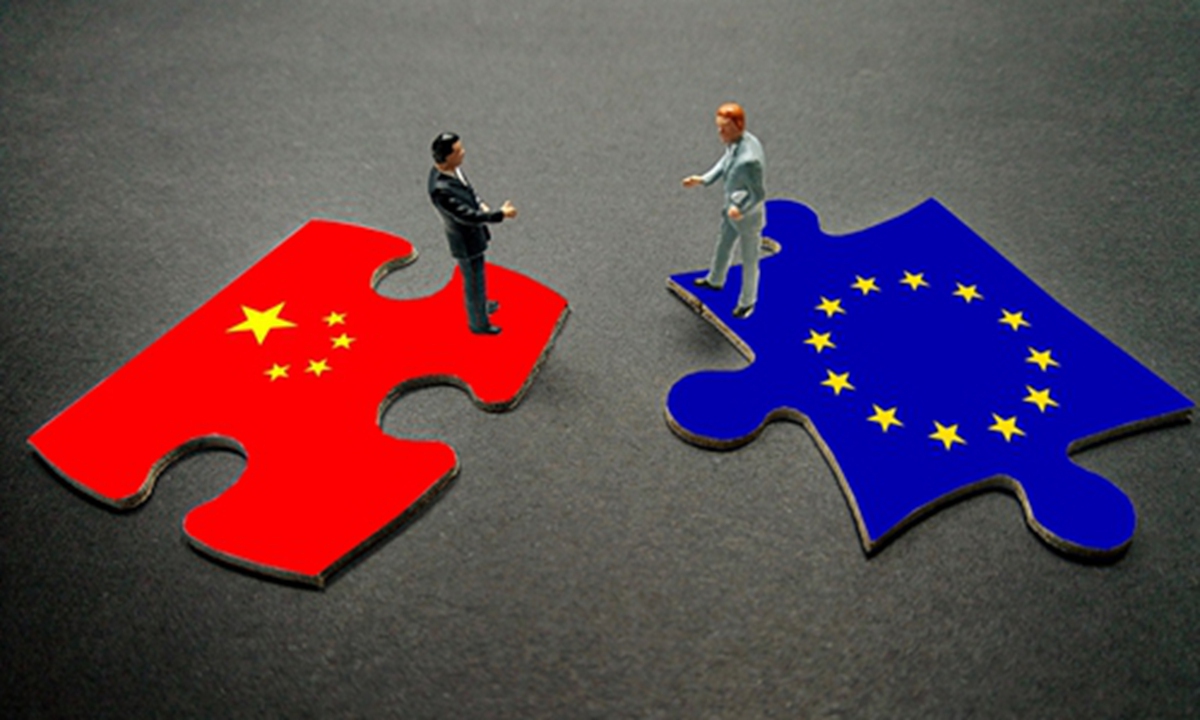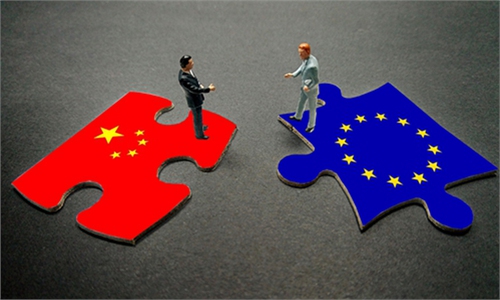EU’s ideal of countering China with its infrastructure plan is plump, but reality is skinny

China-EU relationship Photo: VCG
The EU will host the Global Gateway Forum on Wednesday and Thursday. Leaders from more than 20 countries will attend the event to debate issues relating to global investment in infrastructure. According to a Bloomberg article citing unnamed sources, the forum is "aimed at competing with China in strategic regions."
Notably, it is just one week after China successfully held the third Belt and Road Forum for International Cooperation. An EU official reportedly said, "The EU Commission wants to make the Global Gateway Forum a smaller but more targeted summit than China's Belt and Road Forum."
The Global Gateway strategy was announced by EU Commission President Ursula von der Leyen in September 2021. At her State of Union address, she underlined "a new era of hyper-competitiveness." Although from the very beginning the strategy was said to be endowed with the task of contributing to global development, its focus has been more on its geopolitical ambitions than development objectives.
Zhang Chenyang, an assistant research fellow with the Institute of European Studies, the Chinese Academy of Social Sciences (CASS), told the Global Times that von der Leyen is overly prone to follow the US stance when dealing with international affairs. At the G7 summit in May, she wasted no chance to smear the BRI.
Wang Yiwei, director of the Institute of International Affairs at the Renmin University of China, told the Global Times that the EU has adopted a conservative attitude toward the BRI as it worries that China could threaten its status in global affairs.
"Contrary to the US which opposes China in every aspect, despite the confrontational nature of the EU's Global Gateway strategy, the strategy is more like a defensive move as the EU tries to retain its influence in rules-making and the fields of digital technology and green development," said Wang.
But the just concluded Belt and Road Forum has proven that the BRI has become a popular global public good and made concrete contributions to developing countries. Meanwhile, the Global Gateway strategy proposed by the EU faces multiple challenges. For the EU, the ideal of countering China is plump, but the reality is skinny.
Xue Li, professor and senior fellow from the Department of Foreign Affair at the Institute of World Economics and Politics under CASS, told the Global Times that it is difficult for the EU to mobilize a large sum of money to invest or assist other countries.
"As a supranational organization, the EU can hardly coordinate funds to push forward infrastructure development across the globe like China does. This is the EU's dilemma. From this perspective, the EU, as a non-state actor, is even not comparable to the US," said Xue, adding that the Global Gateway strategy also faces internal policy coordination challenges.
"Some Europeans represented by von der Leyen advocate siding with the US, while those like the Germany government led by Olaf Scholz and German companies are willing to cooperate with China on the BRI, particularly in Central and Eastern Europe as well as other areas where Germany has traditional influence," Xue noted.
Zhang from CASS also noted that as the Global Gateway strategy is value-oriented and sets preconditions, it may raise doubts from object countries.
At the press conference to conclude the results of the third Belt and Road Forum for International Cooperation last week, Member of the Political Bureau of the Communist Party of China Central Committee and Foreign Minister Wang Yi said that China is ready to coordinate with all connectivity initiatives and jointly explore cooperation beneficial to developing countries. He hinted that the BRI can be aligned with the EU's Global Gateway strategy, so as to leverage their respective strengths and form synergy to help developing countries speed up infrastructure development.
This reflects the openness and inclusiveness of the BRI. No matter it is the EU-proposed Global Gateway plan or the China-proposed BRI, they both show the possibility of cooperation in infrastructure and will have a profound impact on filling infrastructure gaps at the global level and regional connectivity. Wang from Renmin University of China proposes that China and the EU have a strategic dialogue mechanism to talk about linking the two. If the EU and some politicians can break away from narrow geopolitical thinking and view this cooperation from a global development perspective, it will provide a good opportunity for the long-term development of China-EU relations.

